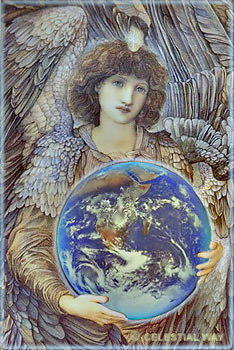THE ALCHEMY OF HEALING
Edward C. Whitmont, MD
|
|
| 1 |
"In view of the reciprocal relationship between part and whole, our own state of being may actually be significant to the health of the whole cosmic order, even in its material bodily aspect."
|
|
| 2 |
"Allegory, analogy, similarity and symbolization comprise a basic 'vocabulary' of information coding, dissemination and transduction, and apply not only to mind but perhaps to the general range of animate and 'inanimate' nature."
|
|
| 3 |
"Classical science has always viewed the state of a system as a whole as merely the result of interaction of its parts. However, the quantum potential stood this view on its ear and indicated that the behavior of parts is actually organized by the whole." Michael Talbot, 'The Holographic Universe', Harper Collins 1991, p. 41
|
|
| 4 |
"We cannot structure our lives solely by the wishes and hopes of our rational understanding. We are cells and partial functions of that universal mind substance. We are mind interracting with Mind, cells interacting with and dependent on organism."
|
|
| 5 |
"In the holographic domain, each organism represents in some manner the universe, and each portion of the universe represents in some manner the organism within it." Karl Pribram, 'What the Fuss is All About'
|
|
| 6 |
"Originally, drama was perceived as a play that represented inexorable destiny. Far from being mere distraction, it was felt to serve the guidance of the soul, according to the laws of a timeless dramaturgy that exacts obedience from the play of destiny, from the living myth, inner as well as outer." Hans-Ulrich Rieker, 'Meditation', Zurich: Raschler 1962, p. 102
|
|
| 7 |
"The seemingly 'weird' language and imagery of dreams, mythology, fairy tales and fantasy can be read as hieroglyphic expressions of messages of the Self's creative intentionality."
|
|
| 8 |
"Hahnemann's discoveries (homeopathy) revive the Medieval doctrine of correspondentia, namely the idea of connection by a context of analogy. Aristotle called it 'formal causation'….It may indeed carry a heuristic value if applied according to holistic, specific gestalt principles – that is, by comparing not single random details or superficial appearances but basic and essential functionalities. The homeopathic experience points to a vast, hitherto unrecognized network of correlations between form, function and behavior as well as outer-world and human forms and functional dynamics. These correspondences which we are barely beginning to discover clearly suggest common functional denominators and patterns underlying the human microcosm and outer macrocosm in mutual analogy and reflection."
|
|
| 9 |
"The experience of drama rests upon the impact of a meaning that arises from the challenge inherent in the tensions and oppositions which bring forth difficulties, threats, conflict and crises calling for a closure or satisfaction of entelechial gestalt patterns through resolution and cooperation of the antithetical elements. Thus, every drama 'makes a point', conveys a message or meaning which is the explication of its entelechy. It brings to the fore an implicate archetype that wants to incarnate and be woven into the web of life."
|
|
| 10 |
"In fact, we can see a dramatic (mythic) process in all the creations of external nature. The provings and therapeutic indications of homeopathy show how even elementary substances, as they embody characteristic personality types and traits, reflect and participate in the human drama of personality and in synchronistic events….we can intuit it in the ways in which the dynamics of human life are synchronized with the movements of the stars and the rhythms of the cosmos."
|
|
| 11 |
"Like flowers and trees, or poems and songs, the plays or stories of life manifestation grow, expand and differentiate the unfolding process of existence."
|
|
|
|
Randomize this reference |
New random category
Add a comment
Reference and bibliography |
All quotes, by category
We are gathering together the primary insights of spirituality and bringing them together into one place.
This archive contains 11,754 quotes, taken from 635 references,
organized in terms of 39 primary categories. Quotes are randomized and appear in a different way at every click.
Explore the navigation options to review these insights.
We include
- All major spiritual and religious traditions, from all cultures, and all historical epochs
- Major psychologists, philosophers, writers, scholars and leading religious personalities
- Sources in classical religion as well as voices from new consciousness, esotericism and mysticism
- Choices are guided by the spirit of oneness, love, kindness, inclusion and community
|

|
|

